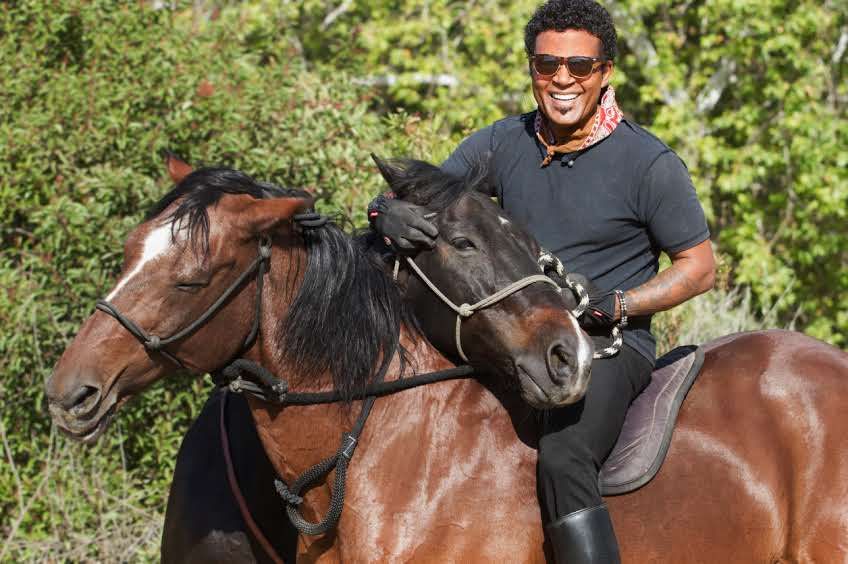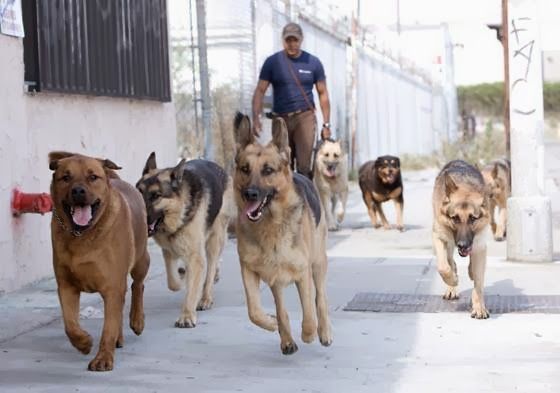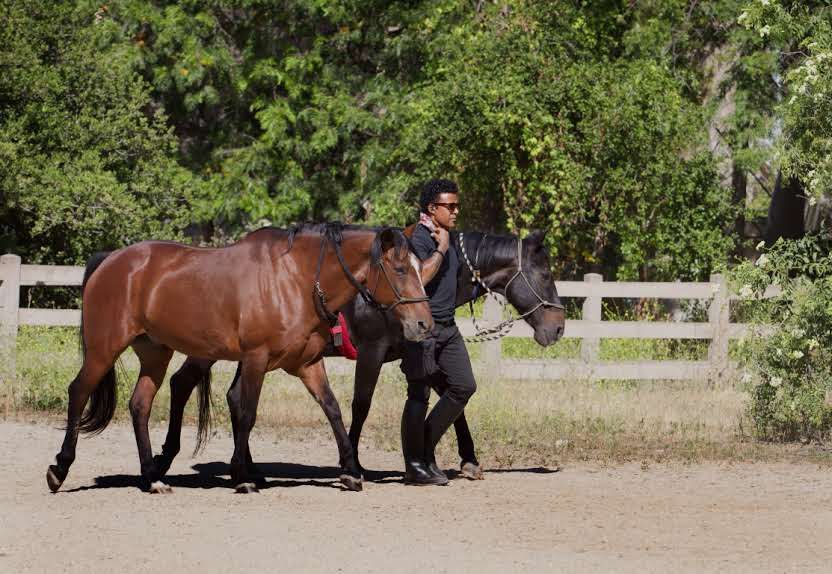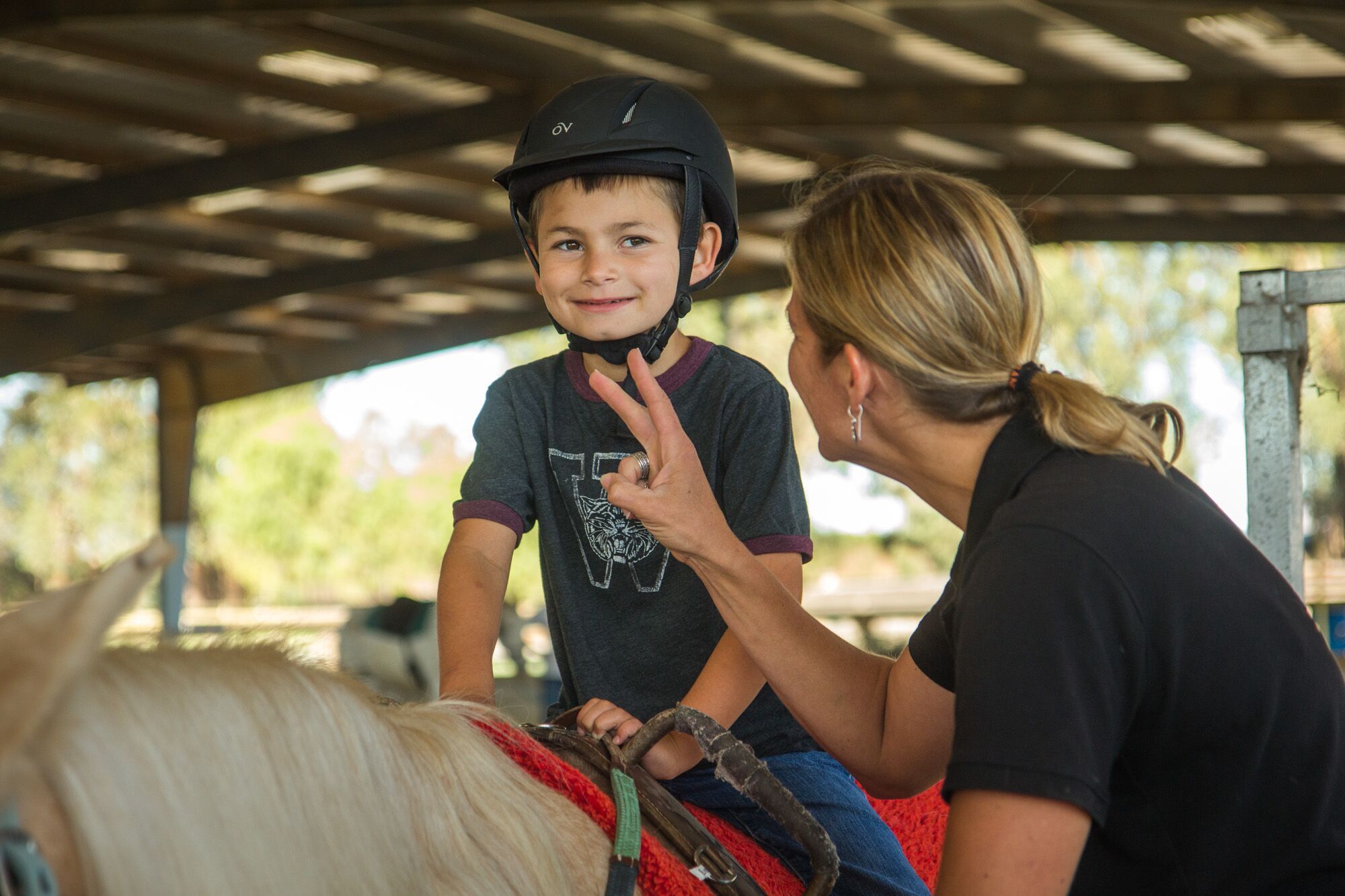Schulz + Brandon Fouche
A leading figure in the rehabilitation of troubled dogs found himself applying the same lessons he had learned working with canines when it came time to work with horses.


When I met Brandon Fouche, I thought I had exhausted all options for my dog. Over the course of six years, the dog we had adopted at just 8 weeks old, developed increasingly more aggressive behaviors towards all dogs and most people. Despite a myriad of trainers and methodologies, nothing seemed to curb the severity of his aggression. Then someone introduced me to Brandon. He changed everything I thought I knew about dogs and saved our lives. I not only consider him my mentor, but a dear friend who is a pioneer in canine behavior.
Schulz x Brandon Fouche
It’s a remarkable origin story. A child, acting on a dare his friends made, jumped into a backyard where a K-9 police dog was kenneled. The German Shepard, trained to protect, attacked the boy, its bite strong enough to leave one of the dog’s teeth lodged in the child’s right upper femur. Following the attack, with the boy hospitalized, the dog was euthanized. At this point, the story takes an unexpected twist. Far from being traumatized by the episode, the child was left bereft by the dog’s mandated death. Fast forward to today and that very same child has grown up to become a leading expert in understanding and rehabilitating canines with behavioral issues.
“Someone once asked me, ‘When you think about happiness, what do you recall?’” Brandon Fouche notes. “The answer,” he continues, “is dogs.” Founder of the Los Angeles-based canine rehabilitation center that bears his name, Fouche practices what he has come to refer to as “The Fouche Way,” a technique that draws from his more than 30-years of experience working with dogs exhibiting behavioral issues. A central tenant of Fouche’s rehabilitation techniques is his belief that we’ve trained our dogs in a way that is contrary to their nature. “To expect a creature with the frontal lobe that's smaller than a child, to understand why I'm doing what I'm doing, there's something wrong there,” Fouche points out.
Living with a dog properly, Fouche argues, begins with a reorientation of assumptions and expectations on the part of the dog owner. For Fouche, this starts with the owner reassessing the emotional expectations they have of their pet. “A human being pursues happiness,” Fouche observes, “but what we don’t understand is that our attempts to make a dog happy as we understand it, ends up making them neurotic,” he notes, adding, “they’re not looking for love the way the human being is.” Indeed, as Fouche sees it, “when we begin to imprint onto the dog, these feelings that we're having, it confuses the dog.”
Take, for example, playing fetch with a dog. Most of us are taught to believe that throwing a ball for a dog to catch brings it a measure of joy. “We believe we’re throwing a ball for the dog to give it exercise, to make it happy,” Fouche points out, noting, “But, if we could ask a dog why it thinks we’re throwing a ball, it would say, ‘You’re raising my prey drive.’” The act of playing fetch, Fouche contends, amplifies a dog's natural, hormone-controlled impulses to hunt and kill, but without the result — the dead prey — the dog expects. It’s but one example of how we interact with dogs, applying positive reinforcement — in this case, the “good dog” that comes bringing the ball back — that, in fact, ultimately confuses canines and can lead to aggressive, neurotic behavior in them. “People will come to me with a problematic dog and say they want a pet who is loving, and sweet, the kind of dog you can hug and kiss,” Fouche notes. “My response to them,” he notes, “is to say ‘Okay, then why do you bring all of these aggressive tendencies out on the dog, if that's what you wanted?’”

In Fouche’s eyes, all the games we play with our dogs — tug of war, roughhousing, throwing balls, not to mention the squeaky toys and stuffed animals we give them — contribute to the developmental imprinting of aggression in them, a behavior we then spend the second half of a dog’s life trying to control and repress. The result of the mixed messages and misunderstandings between dog and owner ultimately manifests in the types of aggressive behavior that Fouche works to rehabilitate. “Aggression is the highest form of communication for animals,” Fouche contends, noting such behavior “is an animal’s response to the stress it feels.” Integral to the Fouche Way is an analysis of underlying drivers which inform and amplify these behaviors —the disposition of a breed (its genetics) and the traits it has developed through learning — and the subsequent rehabilitation of said behaviors via the reparative manipulation of their environment and hormonal responses to them.
Perhaps, not surprisingly, Fouche’s philosophy of canine behavior is a credo that he extends to all animals — including horses. Indeed, as Fouche admits, owning his first horse was a steep learning curve, but it also confirmed his underlying beliefs about how animals behave. “I developed a relationship that was based around positive reinforcement and I spoiled the horse,” Fouche says of the 2-year-old Percheron he adopted. The horse soon began to exhibit neurotic behavioral traits when Fouche wasn’t there, behavior that, later on, he came to recognize as a manifestation of the same kind of separation anxiety dogs express when their owners leave them alone.
One day, while saddling up to ride, Fouche made the connection between his experiences working with aggressive dogs and the missteps he had been making with his horse. “I was getting ready to ride and, sitting there looking at her,” he notes, “I said to myself, ‘She reminds me of one of my pit bulls.’” It was a eureka moment for Fouche. “I recall thinking in that moment, ‘I’m going about this all wrong, I need to treat this horse like a dog,’” he remembers. From that point forward, Fouche applied to the horse the same techniques he had been using on the dogs he was working with. “I made the connection,” he adds, “If you know dogs, you know horses.”
When it came time to get his second horse, Fouche sought out what he calls a “spirited horse,” one that was known to be difficult to handle. His search led him to a 950lb Spanish Mustang that, according to its previous owner, “only the wranglers can ride.” After what he describes as a heart-stopping first ride, Fouche knew he had his work cut out for him. Recognizing many of the same habits and correctives applied to aggressive dogs, one of the first things Fouche did was to remove many of the physical constraints that had been applied to tame the horse. “I started taking things off of him,” Fouche notes, “taking the bit out of his mouth, taking the head tie down, even taking the saddle off, all the way to just putting a rope around his neck.”

Over time, Fouche would take even further steps to connect with the Mustang, stripping away the use of all equipment, save for a dog leash he had attached to a belt around the horse’s neck. Riding bareback, with no shoes, Fouche began to connect with his horse on a wholly new level. “I felt the heat from his body,” he notes, and with the lack of other equipment, Fouche observed that the horse was finally picking up on all of his subtle gestures and commands. “He felt all of my movements,” Fouche adds, noting that, for the first time, “the horse was waiting for me.” Reflecting upon the moment of breakthrough with his horse, Fouche is unreserved: “it's such an incredible feeling, your fear melts away, and is replaced with an unconditional love, a recognition that you’re becoming a part of them."
In addition to Fouche’s removal of corrective restraints, he also sought to rehabilitate the horse’s behavior through an integrative approach that took cues from the surrounding natural habitat. “I saw this trail that led to a dead-end,” he recalls. Believing a horse would be smart enough to stop before reaching the dead-end, Fouche saw an opportunity to condition the horse by bridging its natural inclination to stop with Fouche’s pull on the ad hoc dog leash. “I started running that strip to the mountain and letting him stop,” he notes, “I wouldn't do anything and he started stopping before we got to the dead-end.” Over a period of time, Fouche would ride the horse up to the same dead-end trail, pairing the horse’s instinct to stop with his pull of its lead. One day, as he recalls it, Fouche and the Mustang were coming upon the dead-end when the horse started to slow down. At the same time, he pulled back lightly on the leash around the horse’s neck. “He stopped,” Fouche remembers excitedly, adding, “I got chill bumps because I'm now connecting the way I want to connect.”
Ultimately, regardless of whether it’s a horse or a dog, for Fouche, observing — and respecting — an animal’s intrinsic natural tendencies is the key to successfully cohabitating and working with them. “When you work with horses, dogs or any animal,” Fouche notes, “we're all the same and connected, it's only when we start separating ourselves and trying to control each other, that we lose that connection.”
To learn more about Brandon Fouche, visit his website and consider supporting his Canine hope for improvement program (CHIP) non-profit, focused on promoting the no-kill philosophy and educating dog owners on working in collaboration with their canine's natural inclinations to create a healthy relationship and home for them.

